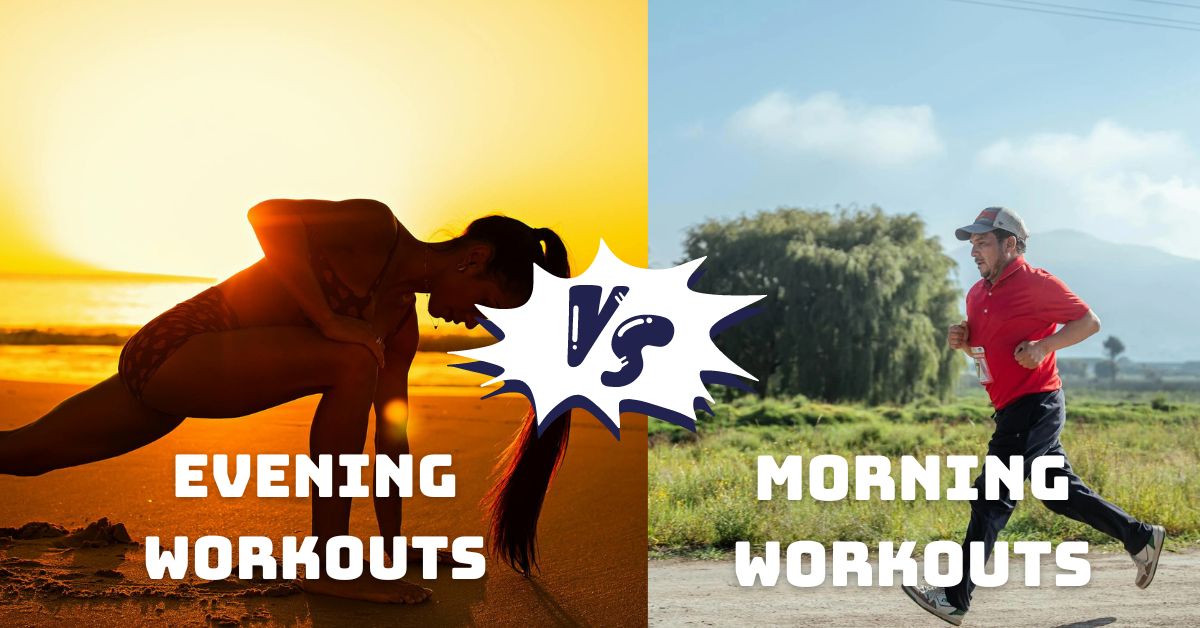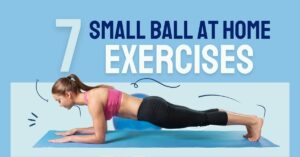Table of Contents
Toggle1. Introduction: Why Workout Timing Matters:
Hey there! Ever wondered when is the best time to work out – morning or evening? Or maybe you’ve heard some people rave about their early-morning runs while others claim they’re stronger at night? Working out at different times of the day can affect your body differently, but there’s no strict right or wrong answer.
The truth is that choosing between morning and evening workouts depends on a few things, like your lifestyle, energy levels, and fitness goals. In this article, we’ll explore the perks of both morning and evening exercise so you can find what works best for you. Ready to dive in?
2. Benefits of Morning Workouts:
Morning workouts offer several benefits, especially if you want to set a positive tone for your day. Let’s explore why some people find exercising in the morning their perfect pick!
Boosts Energy for the Day:
Imagine waking up, getting your workout done, and feeling a burst of energy like a natural coffee boost! When you exercise, your body releases endorphins, often called “feel-good hormones.” These endorphins make you feel happier and give you a noticeable energy lift, making you ready to take on the day.
Plus, when you start your day with physical activity, your metabolism revs up, meaning your body continues to burn calories even after your workout. Isn’t that a great way to kickstart your day?
Improves Mood and Productivity:
Did you know that working out can make you more productive? It’s true! Exercise doesn’t just benefit your body; it also has a positive effect on your brain. During exercise, your body releases serotonin, a chemical that lifts your mood and makes you feel good.
So, a morning workout could mean you’re starting the day on a positive note and possibly having a more productive day overall. Think of it as setting a positive tone that carries you through all your tasks.
It helps Establish a Routine:
Consistency is key to building a lasting fitness habit. When you make a habit of exercising every morning, it becomes as routine as brushing your teeth. You get it done before other things in your day pop up and demand your attention, making it easier to stick with it long-term.
3. Benefits of Evening Workouts:
Now, let’s talk about evening workouts. Working out later in the day is a better fit for some people. It can offer unique benefits that might surprise you.

Maximizes Performance and Strength:
Did you know that people are often naturally stronger and more coordinated in the evening? This is because your body temperature tends to be higher later in the day, which helps your muscles to be more flexible and ready for action. A warmer body is more prepared for intense exercises, making evening workouts ideal for high-performance activities like weightlifting or intense cardio.
Simply put, you can lift heavier, run faster, or perform better during an evening workout.
Helps Relieve Stress:
After a long day, working out can be a great way to de-stress. Exercise reduces cortisol, a stress hormone, helping you wind down. Think of it like shedding the day’s worries and anxieties with every squat or jumping jack.
Exercising in the evening is also a great way to spend some “me time,” which can leave you feeling calm and refreshed when you hit the pillow. If you often feel stressed or anxious after a long day, an evening workout could help you feel more balanced.
Offers More Flexibility:
Mornings can sometimes be rushed. Between getting ready for work or school, breakfast, and other tasks, there’s often little time left for a workout. In the evening, you’re more likely to have a flexible schedule. There’s no rush, and you can take your time to enjoy your workout, knowing the rest of your day is already done.
4. Morning vs Evening Workouts: A Side-by-Side Comparison:
Let’s see how morning and evening workouts stack up against each other in key areas.


Energy Levels and Focus:
- Morning Workouts: These give you a natural energy boost to start the day, helping you feel more alert and ready for your tasks. However, some people may feel dizzy or tired in the morning, making the first few minutes of exercise tougher.
- Evening Workouts: Evening sessions feel easier because you’re already warmed up from the day’s activities. Your body temperature is higher, so moving and stretching is easier.
Consistency and Building Habits:
- Morning Workouts: It is often easier to make a routine in the mornings since you’re tackling your workout first. There’s less chance that something else will get in the way.
- Evening Workouts: Evening workouts can work well, too, especially if you’re not a morning person. Just be careful – unexpected plans or fatigue at the end of the day might sometimes derail your workout.
Body Temperature and Muscle Performance:
- Morning Workouts: Your body temperature is lower early in the morning, and your muscles might feel a bit stiff. A good warm-up is essential to avoid injury.
- Evening Workouts: Your body’s natural temperature peak happens in the afternoon or evening, making it an optimal time to exercise. Muscles are usually more limber, which can improve performance and reduce the risk of injury.
5. Choosing the Best Workout Time for You:
How can you decide the best time for your workouts? Here are some tips to help you find your “sweet spot.”
Listen to Your Energy Cycles:
Notice how your energy changes throughout the day. Are you more energetic in the morning or the evening? Some naturally wake up ready to go, while others find their energy peaks later. Spend a week tracking your energy levels, and you might see a pattern that will help you choose a workout time that aligns with your natural energy.
Match Your Workout to Your Schedule:
Consider your lifestyle and daily commitments. If mornings are hectic, squeezing in a workout might feel more stressful than motivating. On the other hand, if you have free time in the morning, it’s a great opportunity to establish a consistent workout habit.
6. Getting Started: Tips for Morning and Evening Workouts:
Whether you’re a morning riser or a night owl, these tips can help you ease into a routine that works best for you.
Simple Tips to Kickstart a Morning Routine:
- Prepare the Night Before. Lay out your workout clothes, set out any necessary equipment, and even plan your breakfast. This reduces decision-making in the morning.
- Start with Hydration: Drink a glass of water as soon as you wake up. It rehydrates you and can help you feel more awake.
- Ease Into It: Start with 10-15 minutes of light exercise if you need to get used to working out in the morning. Gradually build up as your body adjusts.
Easy Tips for Building an Evening Routine:
- Set a Reminder: Use your phone to set a reminder so you don’t accidentally skip your workout.
- Wind Down with Light Exercise: If it’s late and you don’t want to get too energized before bed, try a low-impact workout or a yoga session.
- Keep It Convenient: Find an exercise routine you enjoy that you can do at home. This way, you’re not relying on the motivation to go somewhere after a long day.
7. Conclusion: It’s All About Personal Preference:
So, what’s the answer? Is it better to work out in the morning or in the evening? Well, it depends! Morning workouts offer a fresh start and help establish a routine, while evening workouts can improve performance and be a great way to unwind.
The most important thing is finding a time that fits your life and helps you stay consistent. You don’t have to be a morning person to get fit, and you don’t have to squeeze in a workout at night if it doesn’t suit you. Choose what feels right, stick to it, and enjoy the journey toward a healthier you!
8. Key Takeaways Morning vs Evening Home Workouts:
✦ Morning workouts boost energy and help build a lasting routine.
✦ Evening workouts might help you feel stronger and are a perfect way to unwind.
✦ Experiment with both times to see which suits you better – and remember, there’s no wrong answer! Whether you’re an early riser or a night owl, the key is consistency.
FAQs: Morning vs Evening Home Workouts:
1. Is it better to work out in the morning or the evening?
There isn’t a one-size-fits-all answer. Morning workouts can increase your energy level for the day and help build a routine, while evening workouts may enhance performance and offer a great way to unwind. The best time depends on your schedule, energy levels, and preference.
2. Do morning workouts help with weight loss?
Yes! Morning exercise can boost your metabolism, helping your body burn calories throughout the day. However, consistency and a balanced diet are essential for weight loss regardless of the workout time.
3. Are evening workouts better for muscle building?
Evening workouts may feel easier for some because body temperature and strength naturally peak later in the day. This can help with muscle flexibility and performance, benefiting strength training. However, muscle growth largely depends on consistency, diet, and intensity, regardless of workout time.
4. What if I’m too tired to work out in the morning?
If you’re not a morning person, that’s okay! Try an evening workout instead. Morning workouts aren’t the only option; evening exercise can also improve fitness. Finding a time when you have the most energy can make working out more enjoyable.
5. Can working out at night disrupt my sleep?
For some people, intense exercise right before bed can make sleeping harder. If this happens to you, try working out a bit earlier in the evening or choose a lighter activity closer to bedtime, like stretching or yoga.
6. How can I make morning workouts easier?
Preparing the night before can make mornings smoother! Lay out your workout clothes, get enough sleep, and start with a light warm-up. Staying hydrated and giving yourself some time to wake up can also help.
7. Can I switch between morning and evening workouts?
Yes! You can mix it up based on your schedule or energy levels. Some people like to work out in the morning on weekdays and evenings on weekends. Just maintain a regular schedule that feels right for you.
8. Does working out at different times affect calorie burn?
Calorie burn is mostly determined by the workout intensity and duration rather than the time of day. Morning workouts may rev up your metabolism earlier, but an evening workout can be as effective if you put in the same effort.
9. Are there specific types of workouts that are better for mornings or evenings?
It’s up to your preference, but many people enjoy lighter exercises like yoga or jogging in the morning. Intense activities like weightlifting or HIIT (High-Intensity Interval Training) can feel easier when your body is naturally warmed up in the evening.
10. How do I decide the best workout time for me?
Consider tracking your energy levels over a week to see if you feel stronger in the morning or evening. Also, consider your schedule and any commitments that might affect your consistency. The ideal workout time is the one that fits best with your life!











